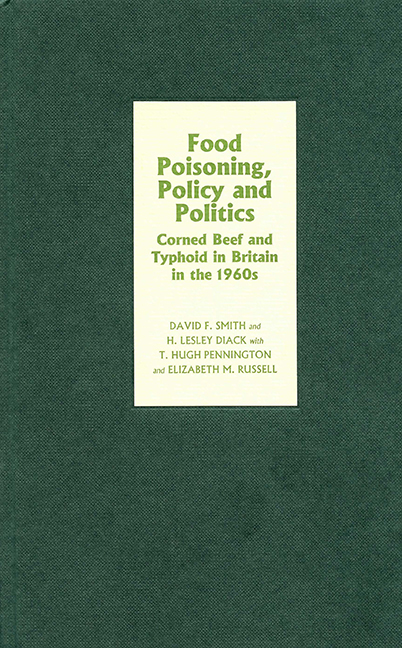Book contents
- Frontmatter
- Contents
- List of illustrations
- Preface and acknowledgements
- Abbreviations used in text
- Abbreviations used in footnotes
- 1 The earlier history of typhoid and food poisoning
- 2 The 1963 corned beef-associated typhoid outbreaks in Harlow, South Shields and Bedford
- 3 The Aberdeen typhoid outbreak
- 4 The medical officer of health, the media and the public in the Aberdeen typhoid outbreak
- 5 Ministers, officials and the Aberdeen typhoid outbreak
- 6 The Milne Committee of Enquiry
- 7 The recommendation on the inspection of overseas meat plants: the roles of existing policy agendas, and interdepartmental and inter-professional tensions
- 8 The disposal of suspect canned meat: the priority of politics over technical advice
- 9 British action to encourage improvements in Argentine meat hygiene, 1964 to 1969
- 10 Summary and conclusions, and food safety since 1964
- Appendix: Recommendations of the Milne Committee
- Bibliography
- Index
8 - The disposal of suspect canned meat: the priority of politics over technical advice
Published online by Cambridge University Press: 24 October 2017
- Frontmatter
- Contents
- List of illustrations
- Preface and acknowledgements
- Abbreviations used in text
- Abbreviations used in footnotes
- 1 The earlier history of typhoid and food poisoning
- 2 The 1963 corned beef-associated typhoid outbreaks in Harlow, South Shields and Bedford
- 3 The Aberdeen typhoid outbreak
- 4 The medical officer of health, the media and the public in the Aberdeen typhoid outbreak
- 5 Ministers, officials and the Aberdeen typhoid outbreak
- 6 The Milne Committee of Enquiry
- 7 The recommendation on the inspection of overseas meat plants: the roles of existing policy agendas, and interdepartmental and inter-professional tensions
- 8 The disposal of suspect canned meat: the priority of politics over technical advice
- 9 British action to encourage improvements in Argentine meat hygiene, 1964 to 1969
- 10 Summary and conclusions, and food safety since 1964
- Appendix: Recommendations of the Milne Committee
- Bibliography
- Index
Summary
Introduction
In September 1964, at their session with Liebig's representatives, the Milne Committee expressed the hope that reprocessing suspect stock, and the reassurance that new stock was produced safely, would rehabilitate corned beef. The committee subsequently recommended that withdrawn produce could be ‘released for sale in the normal way’ after ‘an acceptable method of reprocessing’. At that time, research on reprocessing was nearing completion, and in his statement the Secretary of State for Scotland said that consultations with the trade about reprocessing were underway.
There were about 8000 tons of suspect stockpile material, but the pressing problem was disposing of commercial withdrawn stocks. These included about 500 tons from Argentine 1A, owned by the American company Armour (International Packers) Ltd, and 160 tons from Uruguay Establishment 5, owned by Weddel & Co Ltd, part of the British Vestey Group. These were withdrawn in June 1964. There were also 120 tons of Establishment 25 produce, withdrawn by the Argentine company CAP in 1963, which remained in Britain when Milne reported.
As detailed in Chapter 5, Argentine Establishment 1819 stock was withdrawn following the ‘Wapping Dock incident’, the discovery of Salmonella typhimurium in a can, and an adverse report by the veterinary attaché. The rotting 1819 material at Wapping, imported by Canbury Ltd, was apparently part of a consignment of American army surplus supplies. However, Foley Brothers Ltd and four other importers had imported considerable quantities of 1819 stock directly from Argentina. Foley Brothers held 117 of the 422 tons believed to be in Britain, the rest being in the hands of the other importers, distributors, retailers and various institutions. Of the commercial stock, it became clear that the disposal of the 1819 material would prove most problematic. This was because the importers and distributors had no relationship with the South American suppliers, unlike those holding stock from Argentine establishments 1A and 25, and Uruguay 5.
In this chapter we will follow the story of the eventual disposal of the suspect stock. As a result of interventions by sections of the food trade, the reaction of the press and public, and fear of adverse publicity and political repercussions, the implementation of the Milne Committee's recommendation on reprocessing as originally envisaged proved impossible.
- Type
- Chapter
- Information
- Food Poisoning, Policy and PoliticsCorned Beef and Typhoid in Britain in the 1960s, pp. 220 - 252Publisher: Boydell & BrewerPrint publication year: 2005

